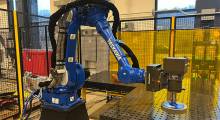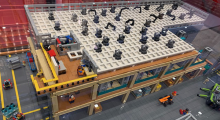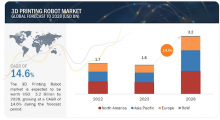Logistics Management Group News Editor Jeff Berman recently spoke with Rick MacDonald, DHL Supply Chain, President, Retail Sector, North America, about varous topics, including the COVID-19 pandemic, final mile logistics, and Peak Season, among others. MacDonald was appointed to his current role in May and has been in the supply chain sector for more than 30 years. MacDonald joined DHL Supply Chain in 2006 and, for the last decade prior to May, served as VP, Retail, DHL Supply Chain North America.
Logistics Management (LM): How would you characterize the last six months, or so, going back to the onset of the COVID-19 pandemic? What is different between now and then, in terms of some of the logistics takeaways?
Rick MacDonald: When COVID-19 came, it certainly brought many new challenges. Most of them centered around peoples’ safety, as well as the surge it brought in many parts of our business…due, in large part, to many more people making purchases online.
LM: From a service perspective, how did the pandemic shift things, for DHL Supply Chain North America, in that did it require a different approach, or tact, compared to pre-pandemic times?
MacDonald: Yes, there has certainly been an evolution since COVID has started that has gone from a very high focus of what we are doing next, as far as preparing our operations safely, given the challenges of the pandemic. We believe that we have evolved very significantly over the last four or five months, from a safety perspective, which involves social distancing and checking employees’ temperatures before they enter a building and all of the things that go along with that. Another part related to how everyone was at home making purchases online a lot more, and much of our retail business enjoyed the surge. That not only was making sure that everyone was safe, but also being able to extend shifts or running more hours per week and also build on our headcount and get more people in to manage the volumes coming through.
LM: How do you see Peak Season shaping up, at this point?
MacDonald: I think things will be very interesting peak-wise this year…in terms of how the consumer reacts and as far as the way they buy. That has been [shifting] over the years, with stores running Black Friday and Cyber Monday sales, as always, but we are now seeing things spread out a bit, both earlier and later, but especially in the latter part of December. And the expectations for service levels have absolutely been heightened significantly.
LM: In what ways?
MacDonald: People do not want to order something online and wait a week for it, or even three or five days. They want it very quickly after they buy it and expect to have it much quicker than we have ever experienced. That has been evolving over the last couple of years, but it is getting bigger and bigger. While managing the expectations of the consumer and providing an environment, in which we can build a workforce that will manage those consumer expectations, we are working hard with our customers on ways to kind of spread that volume. I think we will see a different marketing strategy for many retailers for this peak season than we have in years past. It will be more of managing steady volume across a wider period of time.
LM: Will some of the shifts and changes being put forward retail shippers potentially become permanent in the years to come?
MacDonald: Absolutely. I think this has accelerated a shift in consumer spending habits that will probably head back once we all enjoy the freedoms of moving within groups and without masks on and without PPE. That is certainly coming eventually, but I don’t think it will ever go back to where it was. I think what it has done is accelerated where we were headed anyway, in some fashion. It has changed the landscape, maybe forever, and it will be interesting, for all of us, to see what happens. My view is that we are establishing changes that are going to be sustainable in our business.
LM: Shifting back to Peak Season, there has been a lot going on related to things like peak season surcharges and many major players bringing on additional seasonal staff, in order to keep pace with anticipated demand. How do these types of things impact peak and how is DHL addressing things?
MacDonald: Unfortunately, we all compete, as a group, for the same labor, as well as the same capacity in the marketplace for final mile deliveries. On the labor side, what we are seeing is that people are establishing peak programs much earlier than they have in years past, in terms of bringing employees on earlier and giving them incentives for being on board for a long period of time over the course of peak season. Again, we do all compete for that same labor…and we need to make them feel comfortable coming to work based on our operations, as well be in a position for them to financially benefit from coming to spend time with us over a short period of time…short being anywhere from four-to-12 weeks.
LM: How do you approach managing capacity over the course of Peak Season?
MacDonald: We can get all of the packages ready that we want, but if there is not a final mile provider standing at the door to pick them up, then it is going to affect service levels. That is something our retailers are very, very concerned about. I think they have probably have settled with the idea that if they believe they can get the labor, they can do the work. It is just going to be difficult and more expensive and spread out over a little more time. Many of the retailers are going to be looking to securing some of that final mile capacity up front and will be ready to pay for it. Over the next four-to-six weeks there will be those shippers who realize they have not prepared themselves the way they maybe should have, and that will make for a very competitive market.
LM: What services does DHL Supply Chain North America provide, for final mile deliveries?
MacDonald: We do not do any package delivery to homes for e-commerce. What we are doing is trying to be more efficient and do some long haul or line haul transportation for zone skipping and things like that and try to support those final mile service providers. But once a package goes through a package sorter, at some point, that is where the bottleneck is. We try to shorten the amount they have to haul, but they still need to go through a package sorter [and then to delivery partners].
LM: Looking at the high number of U.S.-bound imports in August, is that a byproduct of preparing for peak or retailers replenishing inventory, or both? Does that change your approach as a service provider?
MacDonald: It certainly has an effect on us. Earlier in the year, there was more uncertainty with much less freight on the water, and people were a little hesitant to secure freight. I don’t know if it is the mindset of everyone, but I tell you what I do see is things have shifted a little bit, with inventories having become very volatile, as online sales have been very profitable across the board and put retailers in the position of it they want to keep selling then they have to keep bringing inventory in. In our warehouses, we are able to flex up for this and bring in a high amount of freight.
LM: Can you please provide an update on how you are deploying robotics in your facilties?
MacDonald: We continue to spend a fair amount of energy and opportunities to support our labor needs through mechanical or automation-related efforts. They can support the people that come to work and make us a little more efficient and increase our capacity. That can be seen through our partnership with LocusBots, in which they help to cut down on how much walking is done in our facilities. Whenever can find a mechanical advantage, for jobs that people don’t like doing, like lifting heavy things, doing a lot of walking, or any monotonous type of jobs, we are looking for opportunities to use a machine where people don’t want to work. That is something that the whole market has embraced over the last couple of years, and I expect that to continue to accelerate.
LM: What are some of the growth initiatives, or strategies, that you have a close eye on as a company, at the moment and into 2021, too?
MacDonald: We have had a major focus on meeting our customers’ needs. Through all of this adversity, we were able to deliver, get people to be able to work safely in our buildings and feel comfortable coming to work and moving our customers’ products. We were early adapters of wearing masks and social distancing across our business. Looking back, I think we did many of the right things along the way. We have enjoyed very strong growth for our retail business over the last three-to-five years, and we expect that to continue. A lot of that is based on how retailers see that supply chain is an important part of their business and that it is not a commodity but a competitive advantage, and that partnering with the right folks to do the right thing for their people and to deliver their products every day.
About the Author
Follow Robotics 24/7 on Linkedin
About the Author
Follow Robotics 24/7 on Linkedin
Article topics
Email Sign Up
















